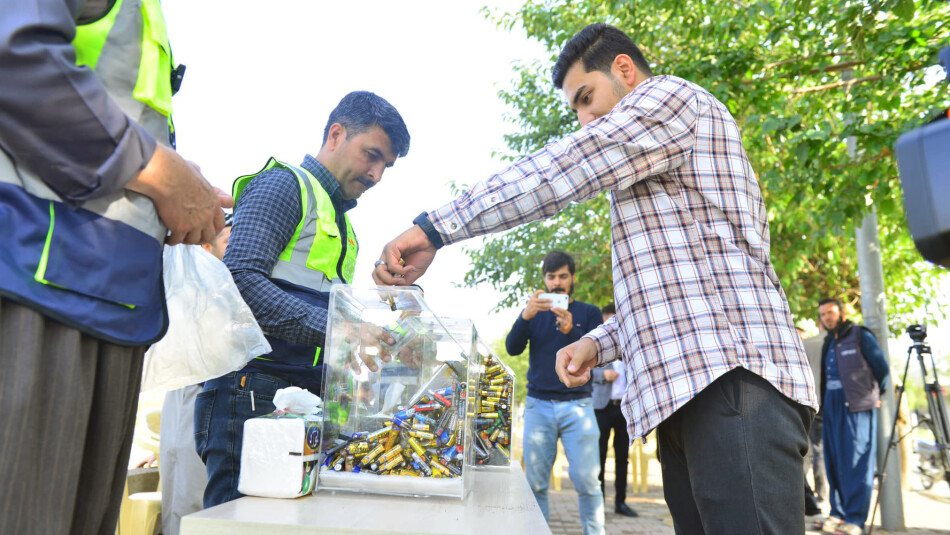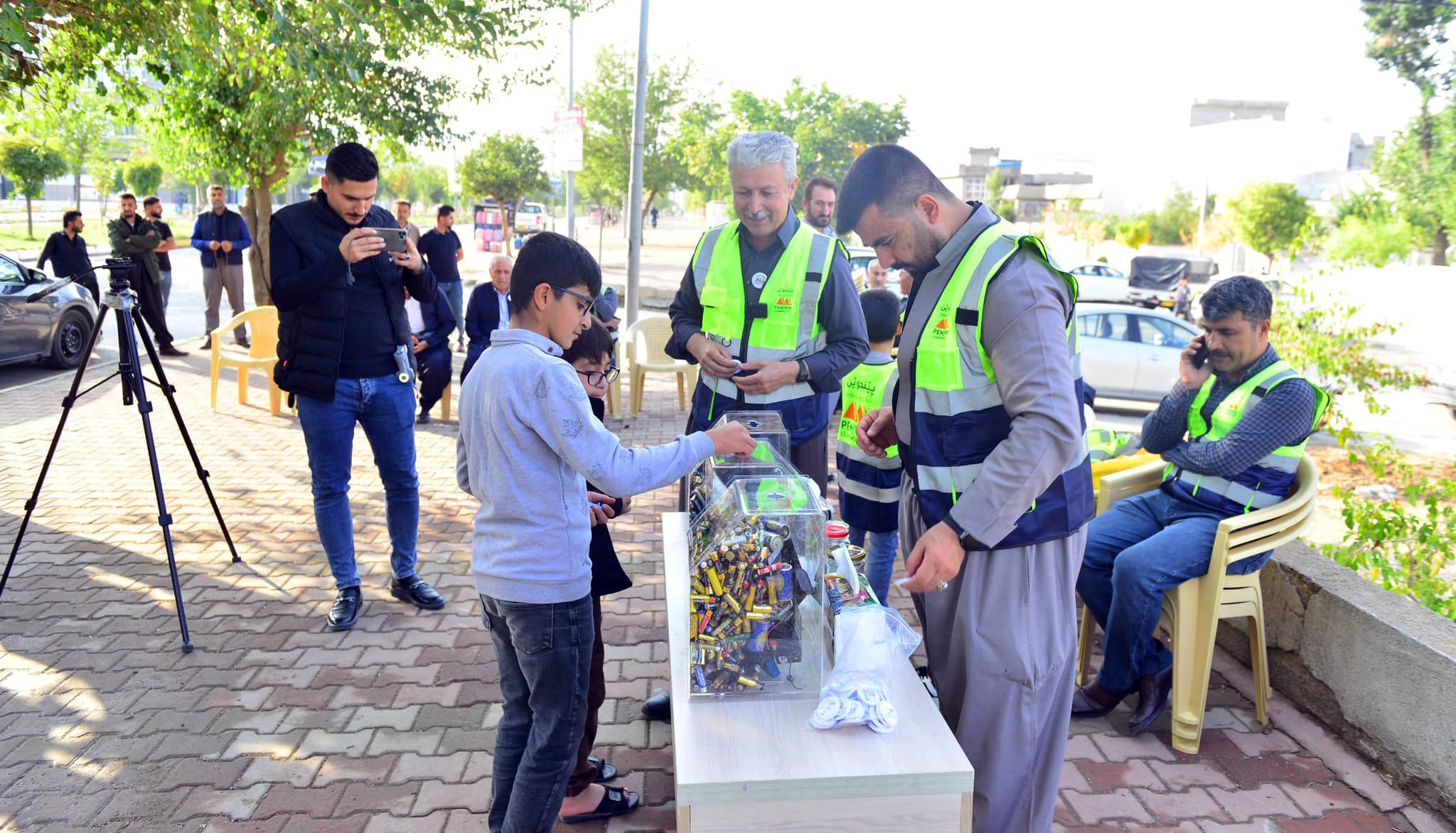
Environmental pollution has become a big concern for Pari Othman, which prompted her to make individual efforts to collect used batteries that could cause environmental disasters if they were not recycled or disposed safely.
“We do not throw away batteries of electronic devices such as mobile phones, remote controls, watches, etc. when they become unusable. I collect them and do not give them to anyone else because I do not trust that they will be disposed properly,” according to computer engineer Pari Othman, who said that her goal is to protect the environment, starting from her home.
There are many who collect batteries and their number is increasing, all of them united by a common concern, which is to protect the environment, rather than personal advantages.
There are many toxic materials in batteries which negatively affect the environment and public health, as most of them are thrown away without being recycled, while the Kurdistan Region’s Board of Environmental Protection and Improvement warns that burning batteries leads to the emission of toxic gases that pollute the air, and in case the batteries are buried, it will affect the soil and groundwater.
A report by the Kurdistan Regional Government’s Ministry of Municipalities and Tourism indicated that the amount of waste collected daily throughout the region reaches six thousand and 829 tons, some of which is treated scientifically while the rest is being burned or buried.
Individual efforts for public benefit
Pari Othman lives in Sulaymaniyah, she embarked on the task of protecting the environment 11 years ago, particularly by collecting used batteries so that they do not pollute the environment.
"I have collected 10 kilograms of batteries so far."
At first, she was alone, but later she invited her relatives and then her colleagues to join her. After collecting the batteries, they hand them over to Pari, who in turn keeps them until she finds a place where she can be sure that the batteries will be treated scientifically and will not return to the environment again.

Sulaimaniyah/ 2024/ Allocating boxes to collect used batteries in public places. Photo: Penjwen Learning City Project Media
Pari says, “Anyone who collects batteries and does not know what to do with them can bring them to me and I will send them to the recycling plant in Tanjaro.”
When Pari learned that batteries contain many toxic materials which cause harm to the soil, water and public health, she decided to wage a silent war against the threats of used batteries.
Some batteries are used once and cannot be recharged and have a short lifespan; there are also rechargeable batteries. Batteries are widely used and are found everywhere and in many devices and tools such as watches, computers, mobile phones, remote controls, electronic calculators, and others.
“So far, I have collected 60 kilograms of batteries. They cause health damage and the chemicals they contain might enter the soil and pollute the environment,” according to Muhammad Othman, who has been collecting batteries for 12 years, in addition to spreading environmental awareness about the harms of used batteries and the need to safely dispose them.
According to the Kurdistan Region’s Board of Environmental Protection, the pollution of soil due to electronic waste such as batteries and mobile devices is a dangerous type of pollution because the materials used in their manufacture are very harmful, as a battery needs 300 years to decompose.
Khelan Muhammad, when she was a student, her teachers talked about the harms of batteries and how they pollute the soil and water. Since then, she has started collecting used batteries and has now completed her studies and graduated from am institute and is now a mother of three children.
“I always collect used batteries that I find in our house, the neighborhood we live in, or anywhere else. I also taught my children not to throw used batteries away and to pick them up wherever they find them.”
Khelan does not pay attention to people who she describes as pessimistic, saying, “My goal is to prevent the destruction of the environment. We have a beautiful homeland and it is a pity that we pollute it.”
In some areas, there are collective efforts and initiatives to collect batteries. Muhammad Abdullah, a religious man in Penjwen district, has been collecting batteries for 15 years. His efforts have paid off and he has played a role in spreading environmental awareness. “Boxes have been placed in most mosques and shops to collect batteries. In our mosque, the box was filled twice.” Muhammad Abdullah is now a member of a volunteer team which is taking on the task.
The group which Abdullah joined is called “Penjwen Learning City,” which their activities also include tree planting campaigns.

“I spoke in Friday sermons about the harms of batteries. Our warnings and advice were useful. The health situation in general is deteriorating and people want to protect themselves from the harms of batteries.” However, Muhammad Abdullah noted that some people do not care about this issue, but in the end everyone must take care of the environment. “If we harm the environment, we are only harming ourselves.”
Confronting an environmental disaster
Muhammad Hawkar roams the neighborhoods of Sulaimaniyah city every day on his three-wheeled motorcycle to collect plastic, scrap metals, and used batteries. He later sells what he has collected except for the batteries which he says do not worth a penny.
“Although I do not earn anything from collecting batteries, I must protect the environment”, says Muhammad Hawkar, father of seven children, who cares about the environment and encourages people via social media to protect the environment.
“In Tanjaro, I put the batteries in an oven and burn them so that they do not pollute the environment, as there is no recycling plant.”
The amount of batteries that Muhammad Hawkar collects varies daily, sometimes he collects two kilograms and other times it reaches ten kilograms.
Batteries contain heavy metals such as lead, cadmium, lithium, manganese, silver, mercury and others, all of which are harmful to public health and the environment, so the Environmental Protection and Improvement Board stresses that the best solution is to recycle them.
Saleh Najib, a professor of environmental sciences, says that whole electronic device becomes waste, not just its battery, and they contain materials that pose threat to health, indicating that these devices are not recycled in a proper way, not only in the Kurdistan Region, but all over the world.
The materials found in batteries and electronic devices negatively affect the health of pregnant women, children, the elderly and those suffering from allergies.
Some of the elements enter the soil or water and are transmitted through agricultural crops to the human body. Saleh cites lead as an example, as this substance affects the human nervous system. He also mentioned mercury which causes anemia, particularly among children, noting that the increase of the percentage of these elements in the soil or the water above the limit results in serious health consequences.
A report by the World Health Organization (WHO) published in 2023 indicated that in 2019, the world generated 53.6 million metric tons of electronic waste, and only 17.4% of this was officially documented as properly collected and recycled.
“People should be warned about the disadvantages of used batteries and the diseases they might cause. We need to first promote environmental education in order to protect ourselves from disasters,” according to the environmental science expert.
Reusing and recycling waste is an effective way to combat environmental pollution in Iraq, which is ranked fifth among the countries most affected by the impacts of climate change, according to UN statistics.
Omed Omar, who supervises the environmental section of the Penjwen Learning City project, which one of its activities include launching campaigns to collect used batteries collection campaigns, has installed boxes in shops, mosques and public places to collect batteries, in addition to raising awareness about the damage they cause to the environment and public health.
“Batteries contain 12 toxic substances that cause many diseases, including cancer. Each battery can pollute one ton of soil and 1,000 cubic meters of water over 50 years,” however, Omed is concerned about the lack of awareness among the population about the threats of used batteries, especially to children.
The campaign has gone beyond Penjwen and reached Sulaimaniyah and other cities. “Many people asked us to set up containers to collect batteries,” Omed explained that they have allocated containers for this purpose in some places and that between 400 and 500 kilograms have been collected so far.
However, the problem is that there are no factories in the Kurdistan Region to recycle used batteries and electronic devices. There are attempts to transfer them to Iran or else wait until a solution is found for the problem in the Kurdistan Region.
Empty boxes
Sulaimaniyah Municipality has a bitter experience with used battery collection campaigns. In the past, boxes allocated for this purpose remained empty, as people used to fill them with paper towels, water bottles and other waste instead.
Muhammad Othman has been through the same experience, so when he collects batteries, he wants to make sure that they are disposed of properly. He does not throw them away or sell them, and prefers waiting for a recycling factory to be established.
Sulaimaniyah’s waste is currently being transported, after being collected, to a dump in the Tanjaro area southwest of the city, where there is a factory for producing renewable energy, where the waste is converted into energy and fuel used to operate a number of factories.
Sulaimaniyah Municipality spokesman, Zardasht Rafiq, says that more than a thousand tons of waste are transported to the recycling factory. “There, the waste is sorted and whatever is recyclable is converted into fuel,” however, 75 percent of the waste is food, plastic, batteries and other materials.
Sulaimaniyah also has a factory for recycling car batteries. The factory was established seven years ago and recycles three to four tons of used car batteries every month.
Environmental Protection and Improvement Law No. 8 issued in 2008 in the Kurdistan Region sets penalties for environmental pollution, including imprisonment and fines of up to 200 million dinars, depending on the type of violation.
Pari Othman regrets the lack of a scientific method such as recycling to protect the environment from battery toxins, in addition to the lack of awareness, so she has no choice but to collect them and transport them to Tanjaro to produce energy, a process that is not without threats to the environment.